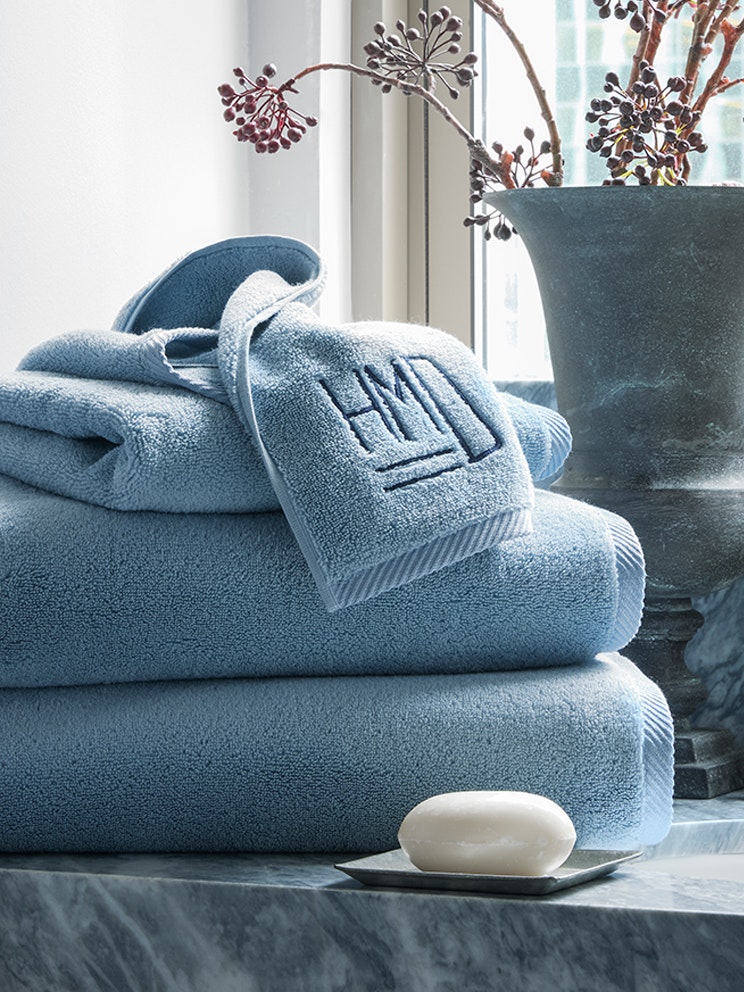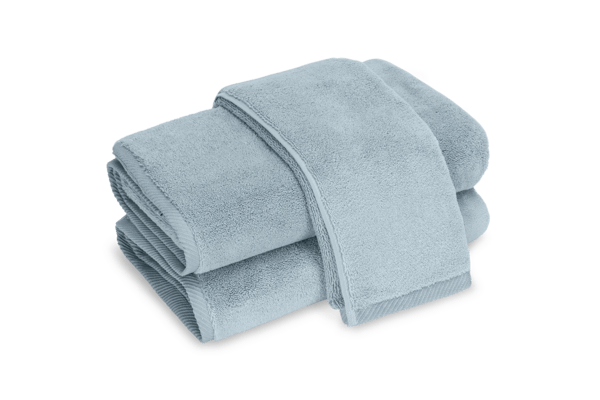Zero twist, ring-spun, terry, loop...we’re sharing the who, what, why of towels, and how to choose the type of towel that's right for you.
We reach for our bath towel each and every day without giving it much thought. However, with such a high use, personal item, it’s worth learning more about the fabric, construction, and details of the many types of towel on the market. We've created a guide to help you do just so. Whether it’s selecting a type of cotton, to twist or not to twist, or picking your dobby, piping, or appliqué, you’ll find all of the answers here.
First, the Fabric
With towels, it's all about the texture, and the feel of a towel tells you a lot about the quality. Matouk towels are made from 100% cotton or long-staple cotton, which is the highest quality you can buy. This cotton produces a fabric that is super soft, strong, and absorbent. Additionally, the higher number of cotton grams per square meter, the softer and more absorbent the towel will be. Matouk towels range from 550 to 700 grams per square meter. Our most popular Milagro towel is 550 grams, while another favorite, Cairo, comes in at 650 grams.
What’s the Twist?
The terms zero-twist or low-twist are often used to describe towels, but often there are no further details provided. Here’s the story: cotton fibers are spun (twisted) into yarn. Typically, yarns are made from short (inferior) fibers that have to be twisted in order to make the yarn. Yarn made from fibers that are twisted gets a lot get harder and less absorbent as a result. If short-staple cotton (i.e. not Egyptian cotton) is used, then the yarns will be hard and the terry will be stiff and less absorbent. Instead, look for zero-twist or low-twist towels.
Zero-twist
Zero-twist towels are so called because instead of being twisted, their high-quality cotton fibers are are held together with a special wrapping thread, allowing them to be woven without breaking. The thread is removed after weaving, leaving the cotton staple in its natural soft, thick state, and the result is wonderfully plush and absorbent. Matouk’s best-selling Milagro towel, as well as our Aman towel, are made from long-staple, zero-twist Egyptian cotton yarns, making both extremely absorbent and plush.
Low-twist
Like zero-twist, this de-twisting action creates more air and space between fibers, which yields a terrycloth fabric that is especially soft and absorbent. Plus, the space between the fibers leads to less drying time after use or washing. Matouk’s Lotus towel is made from low-twist cotton yarns that get softer and fluffier after every wash.
Terry vs. Loop
Terry or Cotton Terry
Terry cloth is a fabric with uncut loops or pile, deliberately standing away from the base. It is woven using two warp beams: the ground warp, which forms the base of the towel and the pile warp, which creates the loops of the thread. This process creates a thoroughly absorbent and cozy towel. Matouk’s Bel Tempo, Cairo, and Whipstitch bath towels are all made of plush, long-staple cotton terry.
Loop
Non-terry towels have a full, un-cut loop. While twists make a towel more sturdy, loop fabric will make a towel more absorbent.
Towel Details: A Glossary
Dobby
A dobby is a decorative weave added to a towel. It can be one of many unique designs, showcased in several of our towel styles, including Guesthouse and Lotus.
Piped Edge
Piping is a type of trim or embellishment consisting of a strip of folded fabric that forms a “pipe” inserted into a seam to define the edges as seen in our Cairo, Cairo Wave, and Enzo towels.
Appliqué
Appliqué is ornamental needlework in which pieces of fabric are sewn or stuck onto a towel to form a specific pattern or design. Matouk appliqués are made from our Nocturne sateen, as shown on our Mirasol towels.
Caring for Your Towels
We recommend washing and drying your towels before using them for the first time. This will remove any residue from the finishing process that might still be on the towel, such as chemical softeners. Such softeners will hinder absorbency, so the towel will actually perform better after being washed once or twice to make sure all those agents are removed. A quality towel should get more absorbent and soft as you use it; not less. Inferior towels have many softening agents on them, so they feel soft to the touch. But as those agents wash off, the towel becomes hard and doesn’t absorb.
Some more helpful care tips for your towels:
-
Don’t leave towels soaking for long periods
-
Avoid detergents with Clorox or bleach alternatives, as they discolor
-
Use spot stain removal
-
Avoid fabric softeners as they make towels less absorbent
-
Wash full loads for balance and effectiveness
-
Never dry on hot! Dry on warm & finish at a cooler temperature
-
Store in a dry location
Final Flourish: How to Style Your Towels
Stymied by how to display your towels? Here we provide a comprehensive towel display guide along with a sizing chart and inspirational ideas from some of our favorite baths.
























